Discovery, Expansion, and Design: Our Five Most Popular Blog Posts in 2022

Imagine a world where every teen has the tools to live a full, healthy, and purposeful life.
At iThrive Games, we view play as a vehicle capable of supporting the shaping of that world and the realization of it. Games, with their lure and immersiveness, invite and reward a wonder that nourishes young people's social and emotional selves by offering them safe spaces to reflect, discover, inquire, experiment, and sharpen essential skills. Our team of adolescent development and instructional design experts see these playful spaces as generative ones ripe with entry points for meaningful learning and mental health support. Working closely with and for teens, we develop social and emotional skill-building games and experiences that bring wellness to the spaces they learn and gather in. The iThrive approach has helped organizations, institutions, and schools that care deeply about teen thriving, envision, create, and test interactive tools that complement and expand on their work and mission while accelerating progress toward a world where young people can thrive.
In 2022, our work continued with more co-design and co-creation, more knowledge-building and knowledge-sharing, and more insights and moving stories shared on our blog that highlight the genius of young people and the transformative power of embodied play. Here is a list of the top five most-read pieces of the year:
New Narrative Game Raises Awareness of ACEs & Their Impact on Youth Mental Health
The SEED Institute, a collaborative effort between Transition HOPE, iThrive Games, and BMA Ten Point Coalition, was a game design studio led by youth of color (ages 14 to 28) who used their experiences in and adjacent to the cradle-to-prison pipeline to create games that depict inequities and advocate for social change. The tabletop, desktop, and virtual reality (VR) games and game prototypes SEED designers created were developed using the iThrive Studio model. Take a look back at this write-up on Children of the Flame, a game envisioned by the young designers in partnership with iThrive and FableVision Studios. The design team's goal: Get everyone who plays it to understand the impact of adolescent childhood experiences (ACEs) and commit to trauma-informed practices that help reduce the harm.
Teens Know What They Need to Be Healthy and Thrive. It's Time We Listen.
At iThrive, we have long centered social and emotional skill-building in our understanding of teen thriving. In adolescence, this is important, but it is not sufficient in the world young people are navigating. From being in community with teens over the last five years and asking them what thriving means to them comes our new, expanded definition of teen thriving that amplifies what they most want and need. Here's how it will instruct iThrive's next chapter of co-creation.
HS Students Learn How to Be Conscious Consumers of Media Through Play
Teens live in a digital world marked by a never-ending stream of information. Supporting their ability to access, evaluate, analyze, communicate, and act on that information is a crucial part of their thriving. iThrive Sim: Follow the Facts builds these media literacy skills through immersive play, inviting high school students to step into the newsroom as journalists and editors tasked with reporting on a breaking story. The game, hosted exclusively on the iThrive Sim platform, mirrors the stressors members of the media navigate providing teens with opportunities to flex and sharpen their social and emotional skills. In July, students at the Collegiate School in Richmond, VA played the simulation game in groups of five. Read what they took away from it.
Game Design for International Relations: iThrive Studio in Olang, Italy
iThrive Studio: Olang, hosted by iThrive's Susan E. Rivers, PhD and History Co:Lab's Fernande Raine, PhD in October, as part of Studienstiftung des Deutschen Volkes' Summer Academy, invited university students to use game design as a tool for unpacking challenges in international relations. Using history as a guide and design as a lever for imagining and calibrating ideas, 20 students conceived, constructed, and pitched six game prototypes by the end of the two-week experience, each presenting solutions to social issues that matter to them. Read what the student game designers learned about power and play.
Supporting a Friend in an Unhealthy Relationship Takes Courage. Teens Say That Takes Practice.
This year, we continued our work supporting One Love, a foundation that connects young people to life-saving prevention education, on a game that will empower the teens who play it with the know-how and skills to recognize and reduce unhealthy behaviors and advocate for healthy relationships. Core to the game's development are the teens we are co-designing with and learning from. Read what they've shared with us so far.
This year has been one of exciting collaboration and tremendous learning. Whether you're a teen who co-designed or playtested with us, a collaborator who trusted our insight, an educator who brought one of our resources to your classroom, or a supporter who cheered us on, we appreciate each of you for the many ways you engaged with us this year. A heartfelt thank you for your commitment to teen thriving!
SEED Designers Share History & Harm of Surveillance in New Escape Room Game
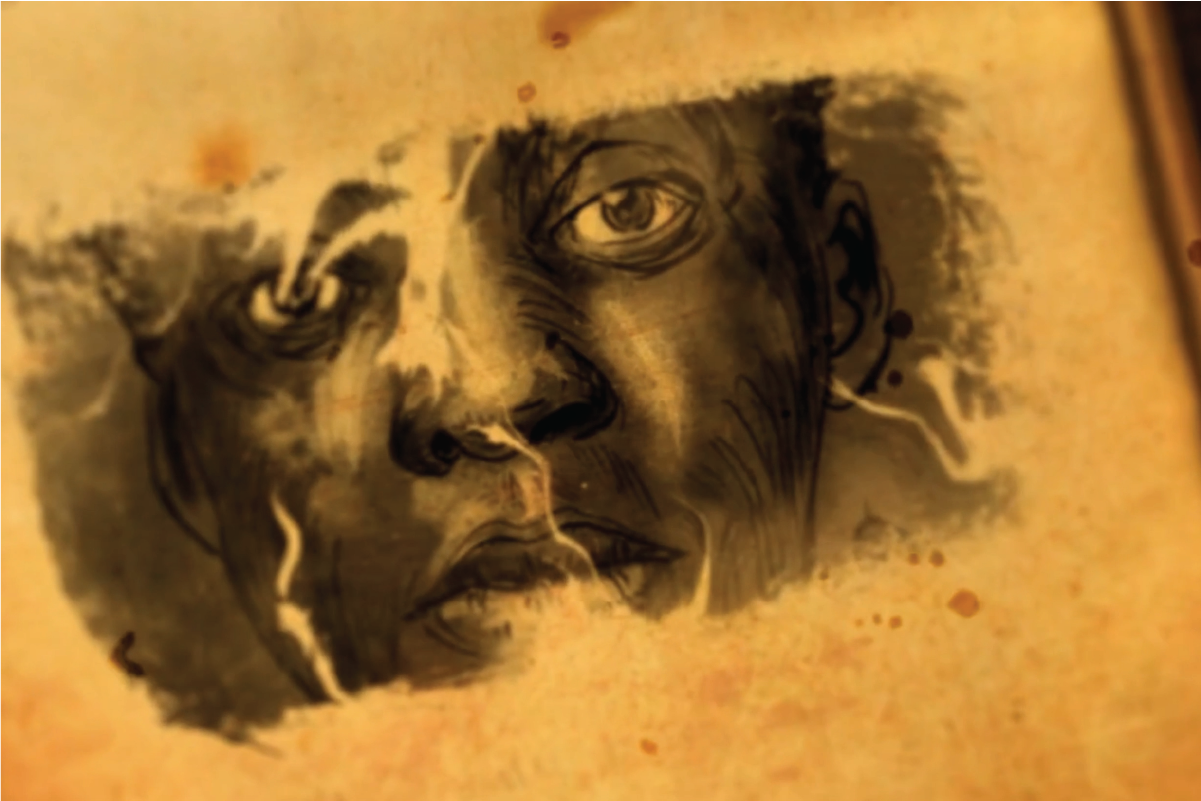
BOSTON—The SEED Institute, a youth-led game design studio collaboratively launched by Transition HOPE, BMA TenPoint, and iThrive Games, was awarded a Summer of Healing grant in July 2022. The funding enabled SEED Designers to bring As They Watch Us, the latest addition to their game library, to shared spaces in Boston, MA, and use its eye-opening play experience to foster conversations about surveillance rooted in truth and restoration with community members.
The SEED Institute creates games that amplify its design team members' lived experiences and perspectives on the cradle-to-prison pipeline, inviting all who play the games to join in their commitment to disrupting its harm. SEED Designers continued their social change work this summer with The Heller School's Racial Justice and Tech Policy Initiative (RJxTP). From their research and discussions with graduate students, researchers, and policymakers came the prototype for As They Watch Us, an escape-room-style PC game that powerfully names and shares how Black and Brown bodies have been surveilled and overpoliced throughout history and to this day.
"As They Watch Us is a game based on the injustice that comes with surveillance and how it affected and still affects the world around us today," shares Jordan, a SEED Designer. "To make it, we researched the oppression that was and still is surveillance, and that research is the very lifeblood of the game. You look through texts, images, and other aspects of four different rooms representative of four different time periods - slavery, the Civil War, the Civil Rights Movement, and today - to find and put together all the pieces of the puzzle about surveillance and its impact."
As They Watch Us uniquely illustrates the throughline of surveillance in Black and Brown communities and its harm in an immersive way that invites players to make meaning of what they encounter as they explore. Using iThrive Games' game design studio approach, SEED Designers merge design thinking with systems thinking. They carefully examine their lived experiences, the historical origins of oppressive systems they navigate or witness, and the policies that enable their ongoing structural harm. "A game presents a compelling and concrete way to think about systems, and the critical thinking involved in that is high level," shares Susan Rivers, Executive Director and Chief Scientist at iThrive Games. "From that critical thinking comes opportunities for SEED Designers to name how things were, how things are, and how things could be."
This summer, SEED Designers brought a prototype of As They Watch Us to We Belong, a youth leadership program led by Boston Police officers Jeff Lopes and Jorge Diaz at Northeastern University. Community members playtested the game and shared learnings and feedback with SEED Designers. Like those who've played games developed by the SEED Institute, community members applauded the play experience for its creativity, resonance, and truth-telling.
The Summer of Healing grant was awarded by Heal America, a movement to fight racial injustice with love and redemption. For SEED Designers, amplifying truth, be it historical or personal, fosters an understanding that sets the scene for reform and reparation. "SEED is trying to teach what is not being taught," shares Jordan. "The racism that has rotted in this country is there and has been there for hundreds of years, so why haven't people been educated? That is the reason for this game. To educate younger generations on surveillance and inequities in technology, to create policies that protect the privacy of Black and Brown communities, and to amend policies that disproportionately harm them."
To Janelle Ridley, founder of Transition HOPE and Associate Director of RJxTP, this centering of young people's perspectives and voices is necessary to disrupt surveillance tactics and the top-down approaches to policy solutions that perpetuate them in different forms throughout history. "We rely heavily on the adults who make these decisions, but they're not the ones that are boots on the ground," she shares. "They're not proximate to the community, and they're not proximate to the system itself. Youth need to inform what policies need to look like and where the changes need to be made."
The spaces, dialogue, and action that the SEED Designers have hosted and ignited with As They Watch Us and the other games they've created is a testament to the brilliance and boldness they've channeled throughout the game development process in advocating for themselves and their communities. "SEED is not an external intervention that people helicoptered in and dumped on the community," shares Rev. David Wright, Executive Director of BMA Ten Point. "This is homegrown. This is organic. This is an intervention that helps people build the resiliency within themselves to be able to make the change that they want to make."
And to Jordan, "all of this is for a better future."
Learn more about the SEED Institute and its library of games at www.seed-institute.com.
Media Contact
Eghosa Asemota
Director of Marketing and Communications, iThrive Games
eghosa.asemota[@]ithrivegames.org
New Narrative Game Raises Awareness of ACEs & Their Impact on Youth Mental Health

"Afraid."
"Disturbed."
"Sad."
"Aware."
These are some of the emotions that Malik, Dana, and Luisa—three of the SEED Designers behind Children of the Flame—want people to feel while playing it. Expanding the SEED Institute's library of games that gives voice to their lived experiences as young people, Children of the Flame is a trauma-informed, single-player narrative game that invites players to engage with a set of characters in a meaningful and awareness-building way. All characters are young people of color who attend the same predominantly white high school and are enrolled in a METCO program there. One afternoon, all characters end up in the same detention room. The player behind the headset must figure out what led the characters to be in trouble. Clicking on each character enables the player to be transported to that character's home, where they can explore their room and neighborhood to learn more about their life, family, and community.

A look at this first vertical slice of the single-player virtual reality (VR) game, Children of the Flame.
Children of the Flame's immersive story structure weaves in generational trauma and adverse childhood experiences (ACEs). The Centers for Disease Control and Prevention (CDC) defines ACEs as potentially traumatic events that happen in childhood (0-17 years). "Everyone experiences ACEs differently and not all young people who experience them will be impacted negatively. Of course, the more ACEs that one experiences, the more likely there is to be a negative impact," says Dr. Lora Henderson, an assistant professor and licensed clinical psychologist who collaborated with SEED Designers on a workbook that'll accompany the game and deepen understanding of the impact of ACEs and trauma. "ACEs and the subsequent trauma they can cause often result in physiological and psychological responses that get in the way of typical adolescent development."
Understanding the need to protect young people's physical and psychological development, the young architects behind Children of the Flame intend for it to be educational and preventative for teenagers in middle and high school. In each character's room—built with game development partners at FableVision Studios—SEED Designers nested opportunities for players to familiarize themselves with ACEs, supporting young people in understanding their developmental impact and influence on physical and mental health. As Luisa said, "having a little bit of knowledge can make a difference." "ACEs can affect anyone," Dana echoed. "Everyone can have trauma or a blocked memory that does not let them see that they also suffer from ACEs too."
The games SEED Designers make and share with the public help create the conditions to better support young people as they develop into adulthood. iThrive Games works closely with the youth design team supporting them with mentorship and guidance that helps them apply and translate their lived experiences into games that reflect the nuances of their journey to stakeholders and advocate for the systems change they'd like to see. Janelle Ridley, Director of the SEED Institute, sees the use of game design as a valuable method for telling stories in a resonant way that ignites action. "This allows other young people to tell their stories in a way that doesn't keep them at guard," shares Ridley. "[It] is a way of having uncomfortable conversations in a manner that allows people to really grasp at what the context and the content of what is actually happening."
Teens who play Children of the Flame and go through its accompanying workbook learn to identify how ACEs and trauma affect how bodies and brains develop. The rich dialogue and visuals in each character's backstory expose teens who have had ACEs to ways that they can seek support, including finding a trusted adult and using language to communicate to others the help they need.
The in-depth research and conversations with mental health practitioners and community members that supported the design and development of Children of the Flame helped SEED Designers make sense of their own experiences. From their introspection and unpacking of their own trauma came supportive tips shared from a place of hope and a desire to disrupt harmful cycles. "[Making this game] helped me reflect and re-evaluate my own life." shares Malik. "I want [players] to know it's not normal what they're going through. And it's not too late."
Advocating for structural supports that will reduce the impact of ACEs, Children of the Flame is also a way for police officers, members of community organizations, school personnel, and other adult stakeholders to deepen their awareness of the need for trauma-based approaches, their understanding of trauma-informed practices, and their commitment to adopting those practices in their work."Trauma-informed practices and approaches create a sense of safety and humanity for young people who are involved in systems," says Dr. Henderson. "By using trauma-informed approaches, systems can ensure that they are not re-traumatizing their young people and that they are uplifting their voices and including them in making decisions that impact them."
Reducing the occurrence of ACEs cannot happen without awareness, and the development of systems that mitigate the impact of ACEs on young people's life outcomes cannot happen without youth voices and ideas steering the change. The social change that SEED Designers want to see and contribute to with Children of the Flame is rooted in this belief. As we observe National Minority Mental Health Awareness Month this July, we're reminded that the unique mental health challenges faced by communities of color are exacerbated by a system that demonstrably over-polices and under-protects them. "Children of the Flame provides a gameplay experience that speaks truthfully about young people's lived experiences in this system," shares Susan Rivers, Executive Director and Chief Scientist at iThrive Games. "This game springboards support to young people, calling all who care about them and staff the spaces they navigate to embody the trauma-informed practices that help reduce the harm."
The first chapter of Children of the Flame is slated to launch later this year as a virtual reality experience and desktop game. The game along with its accompanying workbook will be used to engage stakeholders and raise funds to support its full development. Sign up today to be one of the first people notified when the first chapter of this game becomes available.
iThrive Shares Wins with Affordance, SEED Institute at 2022 Serious Play Awards

For Immediate Release: June 29, 2022
BOSTON— iThrive Games is pleased to announce two shared wins from the 2022 International Serious Play Awards, a program that honors outstanding commercial and student-developed games created for educational use.
iThrive Sim: Lives in Balance, created with our software development partners at Affordance Studio and the masterminds behind the Situation Room Experience, won a gold medal in the K-12 Education category, while Selling Dreams, the latest from youth game designers at the SEED Institute, won silver in the Non-Profit Training category.
Both digital games are hosted on the iThrive Sim platform, a lever for embodied learning and real-time interpersonal connection launched in 2020 to support the unique educational needs of the COVID-19 classroom. On an easy-to-use interface, players are asked to adopt roles, and are presented with unique information and decisions they must wrestle with in real-time. The players make choices that have ripple effects and drive the game forward. The device-agnostic, web-based software uses synchronous and asynchronous information delivery mechanisms to get players to work together and engage with the information they encounter in different ways. The immersion that iThrive Sim facilitates promotes enduring understandings that can be built upon in post-play debriefing sessions.
iThrive Sim: Lives in Balance, played by over 1,600 students and counting, uses iThrive Sim's dynamic features to enliven teen civic learning through student-led connection, improvisation, and embedded opportunities to grow 21st-century competencies. The interactive experience invites teens to play as government officials tasked with making tough decisions in response to a fictional pandemic. As players work through the 35-minute, tech-supported experience together, they evaluate data and lean into social and emotional skills like collaborating, advocating for their points of view and constituents, and compromising with each other to chart a path forward in uncertain times. Curricular surrounds and activities pair with the role-playing simulation game to deepen and extend the civics educational experience.
Selling Dreams, launching later this summer, uses iThrive Sim's immersive platform to tell SEED Designers' stories in an honest and resonant way that names the structural harm and shortcomings they've observed and experienced in Massachusetts' child welfare system. The single-player game invites case workers and youth-serving adults to take on the role of a Guardian tasked with meeting the needs of the young people they encounter and helping them through their unique challenges. In their role as a supportive actor, each Guardian must stay on top of files, messages, and relevant news sent to them about the youth they serve. Players must make decisions throughout the game using the insight they gather about how to engage with those in their care. With the 30-minute game, SEED Designers highlight the demands and stressors experienced by case workers tasked with disrupting the harm while providing a meaningful training opportunity to think critically about the behaviors that encompass truly responsive care and support.
Both digital games attest to the boundless creativity the iThrive Sim authoring platform supports. The content management system used on the platform allows for the development and editing of role-playing scenarios that fit the unique needs of each audience. The iThrive team is excited to invite new partners to use iThrive Sim and support them in creating new interactive, accessible, and scalable learning experiences.
"The iThrive Sim platform is embedding social and emotional learning opportunities to enliven teen-centered learning across so many topics, from civics to relationship health, to emergency preparedness, and more," says Susan Rivers, iThrive Executive Director and Chief Scientist. "One of iThrive's greatest joys is in co-creating new iThrive Sim scenarios with partners — young people and adults alike — in various sectors to amplify teens' strengths and interpersonal connections and make deep learning not only possible but immensely fun and impactful."
To learn more about the iThrive Sim authoring platform, click here. To contact us for questions related to licensing and developing experiences on the iThrive Sim platform, click here.
###
Media Contact: Eghosa Asemota (eghosa.asemota[at]ithrivegames.org)
About iThrive Games: iThrive Games prepares teens to thrive by meeting them where they are and working in partnership with them to co-create a world where their brilliance is honored, nurtured, and amplified. We use games and game design to equip teens with the social and emotional skills they need to be healthy and resilient.
SEEDs’ New Game Pushes for Change in Massachusetts’ Child Welfare System
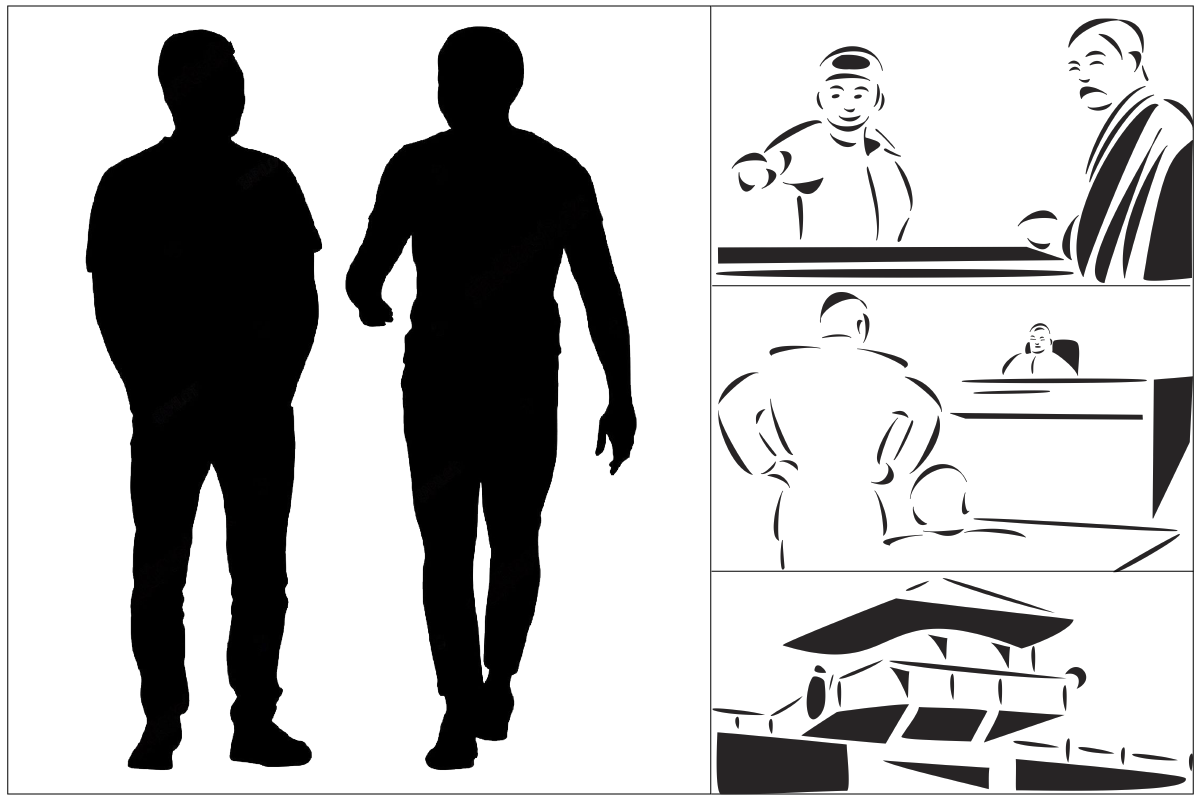
"The system is set up against our community, and it shouldn't be this way," says Kaleya, one of the young designers at the SEED Institute behind Selling Dreams, a single-player online simulation game developed on the iThrive Sim platform. "This game is a wake-up call."
Selling Dreams invites players to take on the role of a Guardian tasked with meeting the needs of the young people they encounter and helping them through their unique challenges. In their role as a supportive actor, each Guardian must stay on top of files, messages, and relevant news sent to them about the youth they serve. Players must make decisions throughout the game using the insight they gather about how to engage with those in their care. These decisions are all final, have different consequences, and can impact the Guardian's 'Respect Meter,' which gauges the level of trust and rapport the young people have toward the player.

"This game shows you what kids are facing—false promises that are being made by the system," shares Bernado, the lead designer behind the SEED Institute's award-winning board game, The Run Around. Like its predecessor, Selling Dreams mirrors the lived experiences of SEED (System Educated Expert Disruptors) Designers who navigate or have navigated Massachusetts' juvenile justice and child welfare systems. The SEED Designers' stories and experiences inform the game's content, reflecting the interactions and relationships they've had with adults to prescribe what was needed in the crucial moment they were in. The designers are training the case workers tasked with disrupting the harm they've personally experienced by inviting them to confront similar harms in the game, and think critically about the behaviors that encompass truly responsive care and support. "Selling Dreams gives the player hands-on experience at taking on the role of a guardian," says Justin, a SEED Designer voicing several of the videos and audio clips featured in the game. "You get a caseload of different youth and have to make the best decisions in order to help their cases."

The short simulation game not only aims to transform the behaviors of the people who staff MA's youth-serving systems but also advocates for structural change by those who design those systems. "There are many stressors and competing demands experienced by adults who are charged with supporting young people in the juvenile justice or child welfare system," says Kaleya, "and these systems heavily affect the youth in our community." These factors in Selling Dreams mirror the real-life circumstances of caseworkers in MA and across the country, reflected in each Guardian's assigned caseload and the pacing of updates they receive. "There's a huge pressure on the Guardian to make the right choices and focus on their cases," says Justin. As the SEED designers note in the impactful play experience they've created with Selling Dreams, part of the work to support young people is making the delivery of responsive care structurally possible in Massachusetts and across the nation.
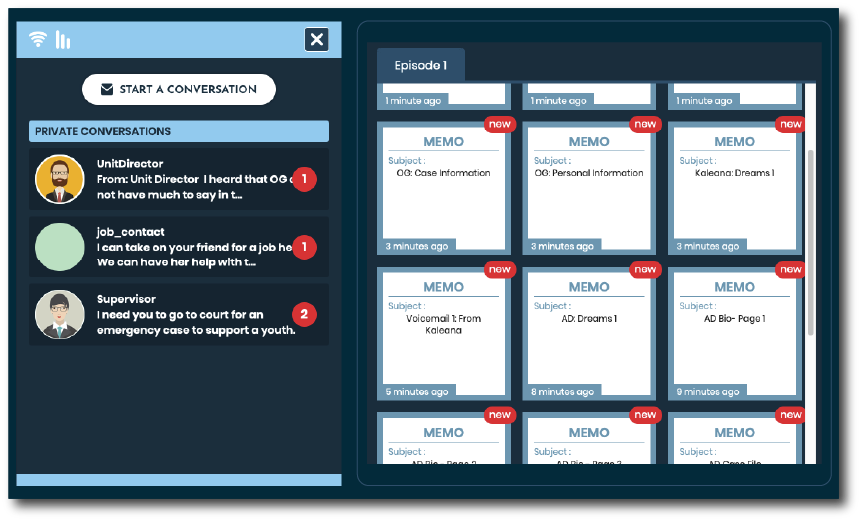
Amidst an intensifying youth mental health crisis, the work to support the well-being of young people demands that we challenge our assumptions about what is needed to keep them safe and support their health and thriving. It takes honesty to design a system of support that meets young people; core to that honesty is the voice of young people. Selling Dreams tells the SEED Designers' stories in an immersive and truthful way that names the structural harm and shortcomings in Massachusetts' child welfare system. The game provides a meaningful training opportunity for youth-serving adults to think critically about how they're showing up for adolescents. It is the SEED Designers' hope that in this current system where young people are functionally voiceless in expressing their needs, this game equips all adults who work in systems that impact young people like them with the insight to approach, engage, and respond to them meaningfully. As shared by SEED Designer Bernado, the goal is for those who play Selling Dream to walk away from the experience with a renewed commitment to "paying attention, listening to the kids, and creating more opportunity for them." In realizing these behaviors, we create an ecosystem of youth-serving actors rooted in care, empathy, and intention.
This summer, Selling Dreams will join the SEED Institute's growing library of games played with stakeholders in Massachusetts and shared with the world to advocate and ignite systems change. Sign up here to be notified when the online game launches and is available for purchase.
SEED Designers Bring Games & Experiences to The Heller School at Brandeis
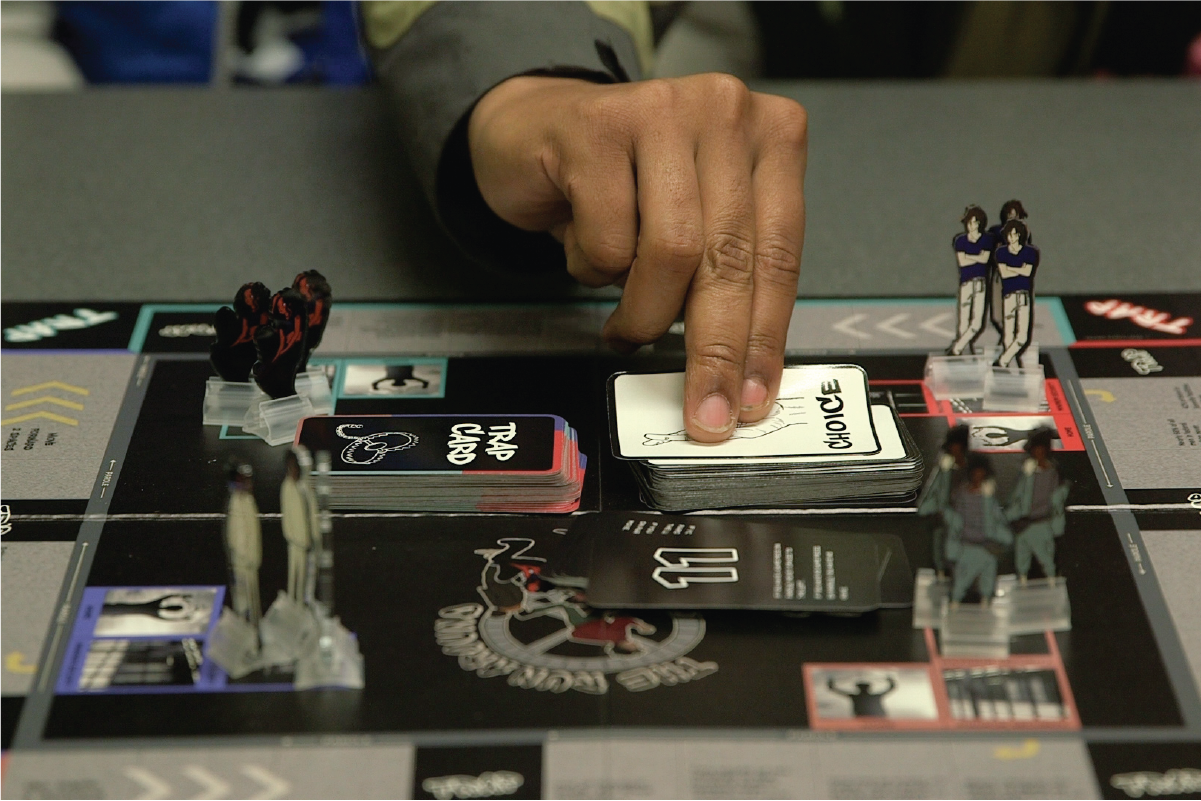
This summer, youth designers at the SEED Institute are bringing their expertise (and games) about the harmful systems they've navigated to graduate students at The Heller School for Social Policy and Management at Brandeis University.
Those who are most impacted by systemic harm know what's needed to disrupt it.
This belief is a foundational one at the SEED Institute, a collaborative effort between Transition HOPE, iThrive Games, and the Black Ministerial Alliance-Ten Point Coalition. At the Institute, young people are SEEDs—System Educated Expert Disruptors. Synthesizing their lived experiences navigating systems of oppression into structured games, SEED Designers use play to advocate for meaningful change in youth-serving institutions. They then bring the games to sessions with community stakeholders throughout Boston, where the designers facilitate play-based conversations to share knowledge, identify and unpack inequities, and imagine possibilities for systems that truly nurture youth. The work of the Institute so far has been powered by SEED Designers' inventiveness and their commitment to building relationships and facilitating conversations that ignite and inspire action.
For a few designers at the SEED Institute, advocacy began with Transition HOPE's Summer of HOPE 2018, an initiative that paired them with graduate students and faculty at The Heller School for Social Policy and Management at Brandeis University. Working as research assistants over seven weeks, the SEED Designers had the opportunity to learn more about how structural violence impacts day-to-day life. Meanwhile, the graduate students and faculty learned more about how to best support young people.
This year, the SEED Institute will continue this vital work with The Heller School's newly launched Racial Justice and Tech Policy Initiative (RJxTP). Through this initiative, SEED Designers will engage in research and develop a game as part of the Hidden Bias Research Prize. RJxTP aims to create more opportunities for knowledge-building and knowledge-sharing between and among youth designers, graduate students, researchers, and policymakers. SEED Designers will use their stories, wisdom, understandings, and ideas to contribute to the dismantling of systems of injustice. Check out the video below for a glimpse of the collaborative work ahead:
Stay in the loop! To quote one of the designers at the SEED Institute, "awareness is like a fire—and that's what we're here for; to spread that fire and spark change in somebody's mind." Keep up with the SEED Institute's design team as they develop and launch new games, and press forward with their advocacy and awareness-building through play, by signing up for our mailing list today.
Game Design Supports Deep Learning. Here’s How It Can Help School Communities.

Engaged learning and connection help us get to the world we're all yearning for—one where we all have the social and emotional faculties to work collaboratively with empathy and curiosity in support of our collective thriving.
At iThrive, we see game design and play as springboards for both, creating connective pathways for knowledge sharing and knowledge building. We invite teachers and students to be game designers as a way to activate deep learning. In using game elements like rules, characters, ways of progressing, and win and loss states to craft a structured game reflective of lived experiences, the game designer has the chance to think concretely about the specific changes they want to see in the systems they navigate. The game they create, in turn, offers a play experience that opens up space for dialogue, exploration, and empathic listening, setting the stage for deep reflection that inspires movement from aspiration to action.
On March 30, iThrive's Susan Rivers and Transition HOPE's Janelle Ridley brought game design to High Tech High Graduate School of Education's Deeper Learning 2022 Education Conference in a deep dive crafted to engage educators in innovative and collaborative thinking. Attendees of their "Game Design for Understanding and Learning" workshop were invited to use game design techniques to reflect on their experiences, connect with other educators who care deeply about student thriving, and envision new practices that support deep learning.
Pulling from our Game Design Studio Toolkit, the four-hour workshop began with play. We played The Run Around, a game created by SEED Designers, and a prototype of one of the games developed by Fugees Family students. These served as an introduction to iThrive's unique use of game design in youth-centered spaces to support generative thinking and social change. Play and icebreakers were followed by empathy mapping, where educators were invited to reflect on their lived experiences as learners and teachers. After analyzing their reflections and noting the shared themes among them, participants synthesized the themes to define core needs, challenges, and possibilities. Working collaboratively in groups, educators then gathered to ideate ways to represent their stories and experiences using game mechanics and world-building tactics. Those ideas came to life in the participants' prototyped game boards and accompanying materials, which were exchanged and playtested by other groups for feedback. From this interactive experience came deep reflection on the needs and wants of students and educators, how things are in education, and how things could be.
 The Warm-Up, Empathize, Define, Ideate, Prototype, and Test sequence taken from the Game Design Studio Toolkit.
The Warm-Up, Empathize, Define, Ideate, Prototype, and Test sequence taken from the Game Design Studio Toolkit.
By the end of the "Game Design for Understanding and Learning" deep dive, 25 educators created four game prototypes that focused on topics such as the importance of designing learning experiences for student agency; the unreasonable demands placed on teachers; how a culture of deeper learning, in contrast to a culture of testing, leads to student success ; and supporting students to embrace productive struggle. Each of these games was demoed at the Deeper Learning Showcase later that afternoon.

Game prototypes shared at the Deeper Learning 2022 Showcase.
Participants in the deep dive shared that crafting a game based on their lived experience was a great way to solidify their thoughts, think critically about systems they've navigated, and identify ways to change those systems. All were excited and engaged by the deep learning and reflection that surfaced from the experience, with teachers afterward calling game design "collaborative," "relevant," and "an interesting way to view issues and problems."
"The openness and curiosity that comes from play, which is energy giving, creates opportunity for imagination, and to think about what could be next," shares iThrive's Susan Rivers. "Bringing the Game Design Studio approach to Deeper Learning was an opportunity to support teachers in reflecting on new ways of doing and being in and outside of the classroom in service of young people's thriving."
For educators and administrators interested in unpacking challenges in their school communities or sparking new ideas that contribute to educator and student thriving, we invite you to use design thinking activities from our Game Design Studio Toolkit in your brainstorming. Activities included within the complete kit support active listening, needs mapping, and iterative testing to ensure the solutions you dream up with your team are relevant and responsive to your school's unique goals.
Here's a glimpse of what's on the other end of the exploration the Toolkit guides its users through in the context of education:

Interested in using game design to support design thinking and program development in your school community? Contact us to explore facilitation options crafted to help educators and administrators co-design youth-centered solutions with their students.
iThrive’s 2021 Annual Report Celebrates Teen Genius, Community, and Play
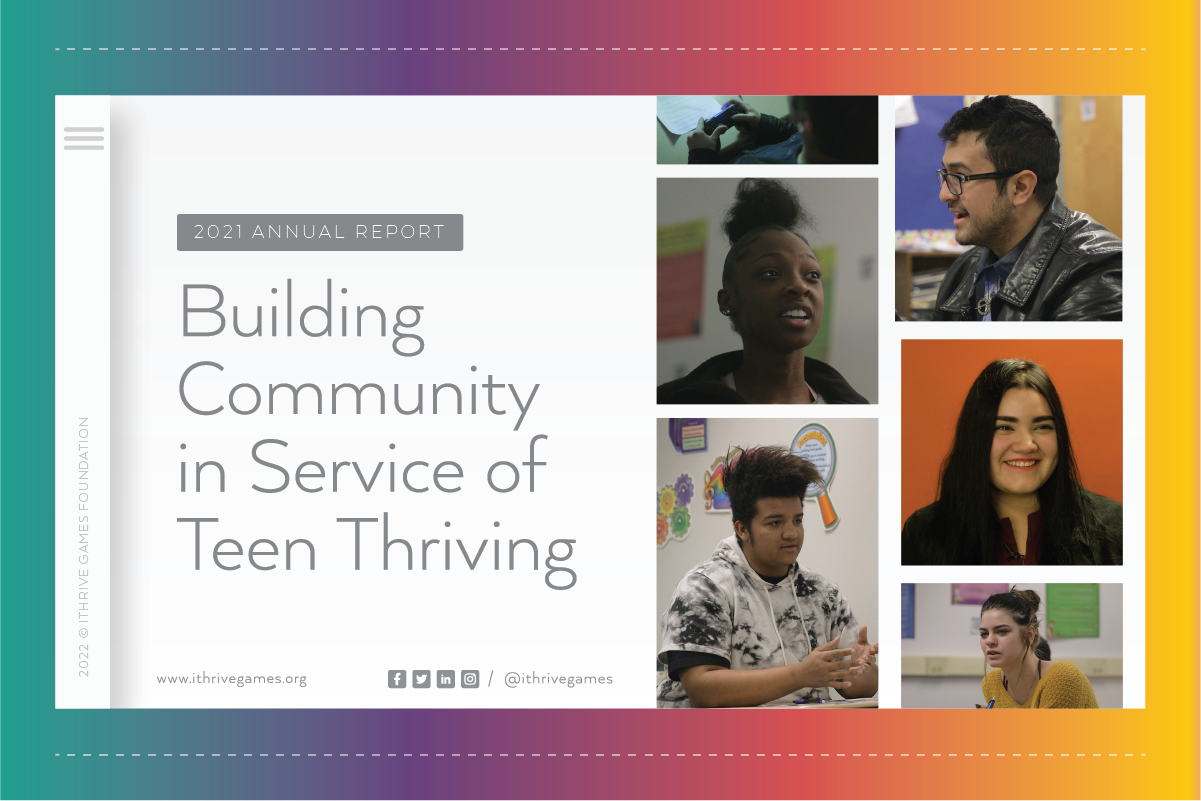
Connection brings healing the same way co-creation brings innovation—through intention.
In 2021, we intentionally leaned into both, connecting with teens, educators, game developers, university partners, museums, and youth-serving organizations across the globe to co-design meaningful learning experiences that enlist the power of play to support teen thriving.
True to our mission and vision, we actively sought partners who want to engage young people in their genius and support them in developing the social and emotional skills to be in the world they will one day inherit with both empathy and curiosity. Bridging our partners' subject matter expertise with our co-design approach ensured that teen voice remained at the center of every tool, experience, and resource that sought to engage them. Our 2021 Annual Report, Building Community In Service of Teen Thriving, highlights all that we co-created, refined, and shared last year. Here are a some of the report's highlights:
- Our commitment to knowledge-building and knowledge-sharing brought us to conferences where we connected, learned from, and shared with game designers, researchers, educators, administrators, policymakers, and other intersectional experts across the globe.
- iThrive Sim, our award-winning ed tech tool that hosts immersive civic learning experiences, expanded with two new role-playing simulation scenarios: Leading Through Crisis and Follow the Facts, both of which were created with guidance and input from students, teachers, and subject matter experts.
- In May, we launched iThrive Curriculum's third game-based learning unit, A Moment in Time, an eight-lesson social and emotional learning experience that pairs with the mobile game Florence and supports teens in reflecting on relationships, grief, loss, and life shifts.
- Working in partnership with iThrive, youth designers at the SEED Institute created and launched The Run Around, a board game that mirrors their lived experiences in the juvenile justice system, authentically communicates its harm, and advocates for structural supports capable of disrupting it. Since launching, The Run Around has garnered press in The Boston Globe and won gold at Serious Games' 2021 Serious Play Awards.
- Working with High Resolves Group and Rise, an initiative of Schmidt Futures, we have been working on curating transformative educational experiences and making them widely available through Symphony, a new online tool that supports student-centered and self-directed learning.
An all-of-us approach is needed in supporting youth as they navigate the complex challenges of this time. A special thank you to every teen, educator, and collaborator who connected with us in 2021 and joined us in our commitment to creating learning environments and shared spaces that ignite and value the potential of young people.
2021 Was a Year of Co-Creation, Collaborative Learning, and Play
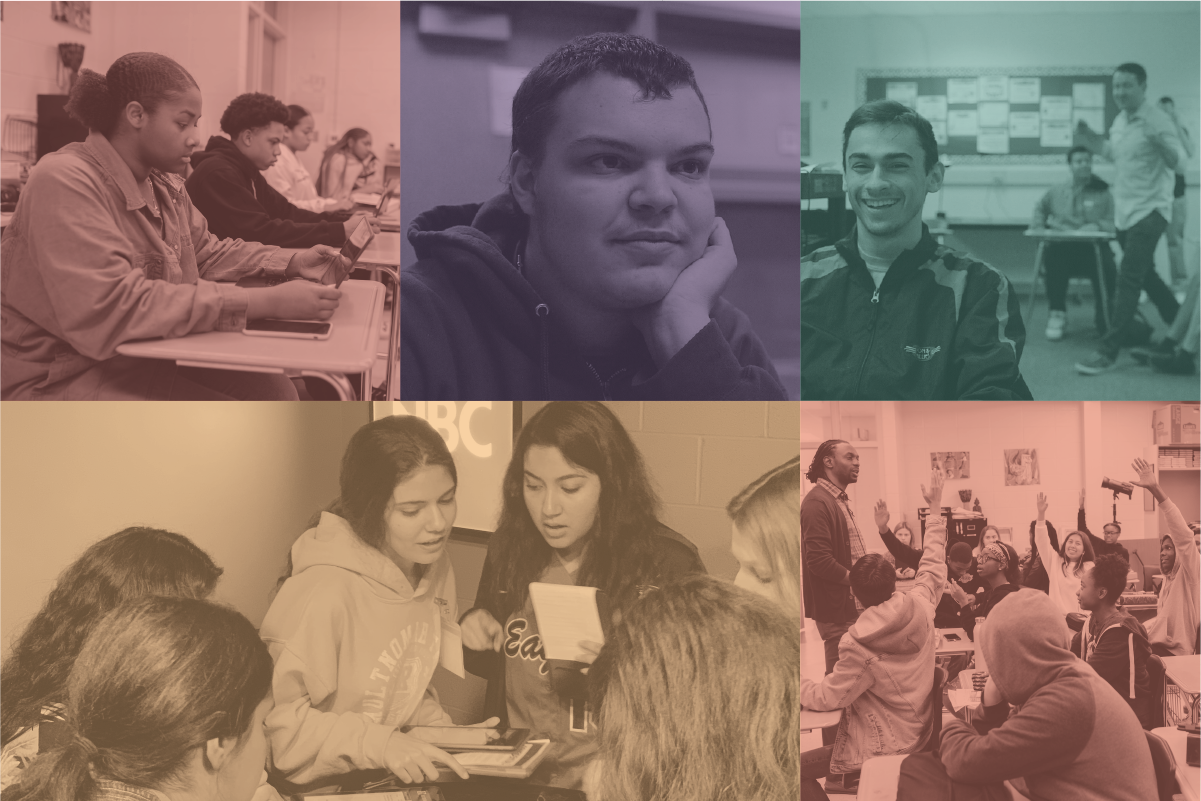
Whenever we are in connection, we learn about ourselves and each other. We entered 2021 with this belief in mind, seeking community with teens and educators to fully understand their challenges, desires, and needs in the classroom and beyond. From our commitment to knowledge-building came co-creation, and the development of new meaningful and collaborative learning experiences that resonate with young people, support their social and emotional development, and meet them where they are through play.
We were happy to release iThrive Curriculum: A Moment in Time, grow iThrive Sim's library with two new scenarios, Follow the Facts and Leading Through Crisis, and launch the Game Design Studio Toolkit after five years of collaboration. After equity reviews of Sam's Journey and Museum of Me, we updated both game-based learning units to include more means of engagement, representation, and action/expression and ensure all learners feel valued, seen, and supported in their genius. At the SEED Institute, we pressed forward in our partnership with Transition HOPE and engaged youth with lived experiences in the cradle-to-prison pipeline via game design, which led to the launch of The RunAround, a board game that highlights the hardships that lie in the journey from 'Maximum Security' to 'Home,' and opportunities to disrupt and dismantle them.
This year, we worked to provide teens with transformative opportunities to see possibilities they never before imagined, open up their thinking about themselves, each other, and the world, and build essential social and emotional skills that support them in stepping fully into their genius. Whether you downloaded an iThrive Curriculum unit, brought an iThrive Sim role-playing simulation scenario to your classroom, or read an article we shared, we appreciate you for the many ways you engaged with us this year. Below is a snapshot of the top five blog posts our readers viewed the most this year:
1. Teens Have Big Emotions. How Can We Help HS Students Navigate Them?: A rapidly developing brain in an increasingly complex world makes for big emotions. How can we help teens cope with them? HS educator and co-author of our game-based learning unit iThrive Curriculum: A Moment in Time Lauren Geschel shares: "recognize them as individuals," "validate their feelings," and "help them be self-aware and deliberate."
2. High School Teachers, Share Your Feedback on the New, Improved iThrive Sim: Read about iThrive Sim's teacher-friendly interface, a feature recently added to the award-winning tool to support high school educators in customizing, facilitating, and steering iThrive Sim's role-playing simulation scenarios in a way that best meets their students' social, and emotional needs.
3. Game-Based Learning Reads: Three Books That Will Make You a GBL Believer: With game-based learning, teachers use play to engage their students in their own learning, embracing student agency over student compliance. Read what seasoned educators and game-based learning experts Matthew Farber, Kat Schrier, and David Seelow say about it in this aggregate book review of their latest reads.
4. Burgeoning Journalists Try on Their Roles in New Media Literacy Game: In this digital age, more data is produced in a second than can be consumed in a lifetime. Our new role-playing simulation game iThrive Sim: Follow the Facts centers media literacy and nurtures players' ability to analyze, evaluate, and report on that data. Read what playing it did for two dozen high school students and burgeoning journalists at the Arizona State University's Summer Journalism Institute.
5. Use this SEL Activity to Help Your Students Process Pandemic Grief and Loss: For teens, grief and loss have been palpable both personally and collectively over the last two years. This social-emotional learning activity invites your students to unpack and process their experiences of these emotions during the pandemic.
As the year winds down, we hope you continue prioritizing connection and wellness throughout the holiday season. Stay connected with us next year by signing up for our monthly newsletter, stocked with updates on our game-based learning products along with exclusive opportunities to try them with your students. Here's to more community, co-creation, and play in 2022.
Youth Designers Collaborating with iThrive Games Win Serious Play Award
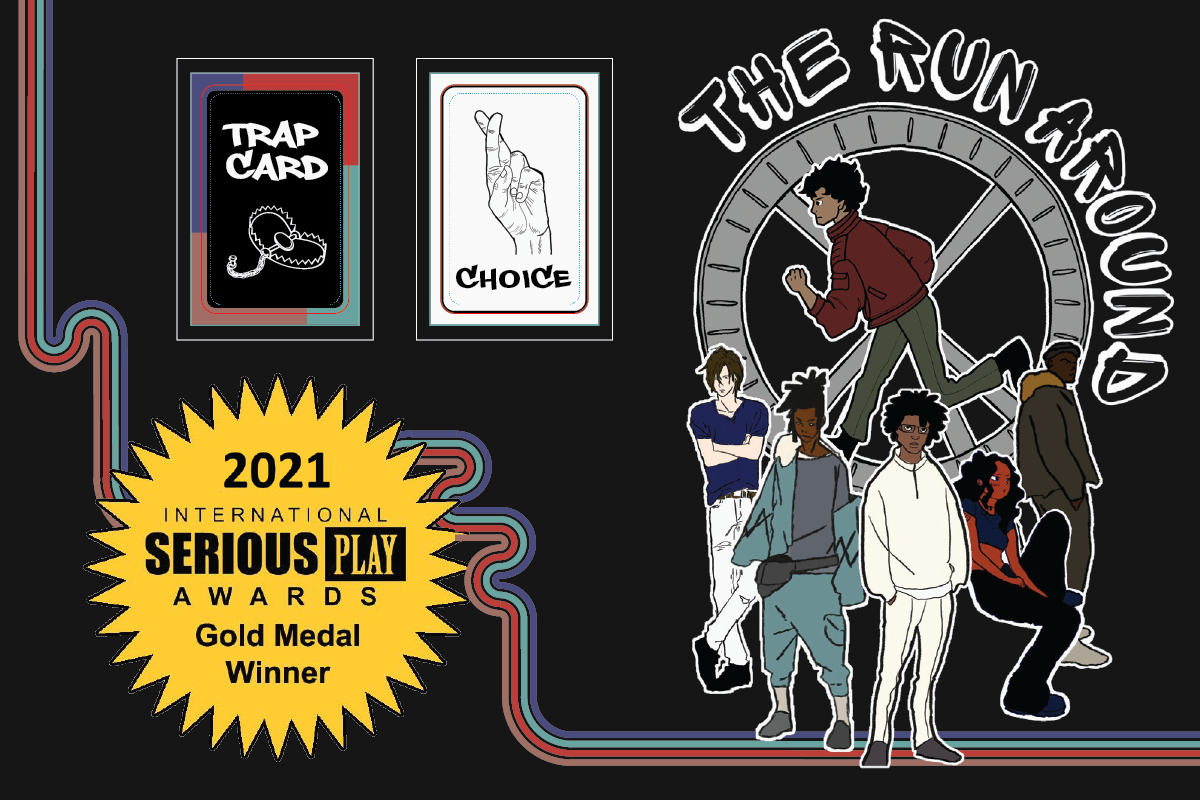
BOSTON—iThrive Games is pleased to announce that The Run Around, created by youth designers in partnership with iThrive; Janelle Ridley, Founder of Transition HOPE; AGNCY; Black Ministerial Alliance/Ten Point Coalition; and Dr. Beverley Cush Evans with Lesley University; won a gold medal in the category of Educational Tabletop Games in the 2021 International Serious Play Awards Program. The program honors outstanding commercial and student titles used for education or training.
Created from the lived experiences of the youth who designed it, The Run Around is focused on raising awareness about inequalities in the justice system. The designers sought to use their voice to shed understanding on the emotional, mental, and spiritual bondage the system creates, as they do not want others to fall into the same traps.
Staff members were inspired by the experience of working with the youth designers.
"The process of changing and dismantling unjust systems has to center the voices of those who have been impacted by it," said Susan E. Rivers, Ph.D., Executive Director and Chief Scientist at iThrive Games. "I'm proud of the youth designers who shared their stories, challenges, and triumphs and collaborated to create this game that will educate adults on their lived experiences."
The Run Around was developed to encourage empathy and change, with funding from the William T. Grant Foundation and the DN Batten Foundation. Game design and gameplay provide an opportunity to have important conversations around critical questions for designing systems that better support youth: how can systems help youth who are getting out of the justice system reintegrate successfully to stable living? How can we better understand young people's feelings, behaviors, and experiences to provide the structures, opportunities, and environments they need to thrive?
To learn more about the SEED Institute, which highlights youth designers, click here. Click here to read more information about the game design process.
###
Media Contact
Eghosa Asemota
eghosa.asemota[at]ithrivegames.org
ABOUT iTHRIVE GAMES
iThrive Games prepares teens to thrive by meeting them where they are and working in partnership towards a world where all have the voice, choice, and agency to reach their full potential. We use games and game design to equip teens with the social and emotional skills they need to be healthy and resilient.
